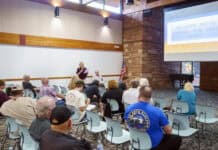The Sedona Lodging Council and Sedona Chamber of Commerce will present a forum to the public Wednesday, Sept. 22, about the facts and misperceptions of vacation rentals, state law and what residents can and cannot do regarding them.
We highly encourage residents to attend.
Prior to 2016, vacation rentals were illegal in Sedona, Jerome, Bisbee and Tucson and a non-issue or not regulated throughout the rest of the state.
The Arizona State Legislature’s legalization of rentals was not partisan. Senate Bill 1350 was passed by 14 Republicans and 11 Democrats in the Senate, and 29 Republicans and 23 Democrats in the House. It went into effect in May 2016.
The bill passed because of hard, dedicated lobbying by vacation rental listing firms that stood to make hundreds of millions connecting renters with homeowners and taking a small cut for using their platforms.
As is so often the case, the vast majority of legislators were not well versed in the housing market, the lodging industry nor the potential aftermath if they passed such a bill, so they did so blindly.

Many lawmakers have stated in the years since they were misled by the belief sold to them by lobbyists and the vacation rental listing businesses, that the majority of these properties would be single rooms, guest houses or second homes periodically rented out so on-site homeowners could make ends meet or make a little cash on the side.
Debbie Lesko, now a U.S. congresswoman but then a state senator who sponsored the bill, wrote into the law that governments could not collect taxes — an absurdity which the legislature later fixed. She also tacked on last-minute language forbidding counties, towns and cities from regulating these rentals in any way, from enforcing or imposing new ordinances, and from enforcing their residential zoning regulations to interfere with these commercial profit-making enterprises — dooming our communities to suffer them without any relief whatsoever.
Due to Lesko and the lobbyists, there was nothing to stop prospective speculators and out-of-state homebuyers snatching up residential property in prized areas like Sedona, Jerome and Flagstaff, sometimes dozens of homes, evicting tenants and turning long-term rentals into highly profitable short-term rentals.
Now commercial vacation rentals — many not owned by Arizonans — are eating up residential neighborhoods in Northern Arizona towns without any regulations. They’re also competing with the highly regulated and taxed hotel and motel industry by converting many residential neighborhoods into de facto commercial lodging parcels.
Under the false auspices of being “good neighbors,” lobbyists and these hosting companies have imposed some internal rules and floated toothless legislative bills, banning things like party houses, but not dealing with the actual problem: Profit-focused LLCs and small corporations wrecking neighborhoods while using the on-site homeowners renting a guest house or room as pawns to drive a false narrative that vacation rentals are being run by our neighbors, not corporate carpetbagging shareholders.
Whenever prospective legislation comes along that would allow municipalities and counties to better regulate or enforce zoning regulations, hosting companies’ lobbyists are quick to act with all their effort to stop the bills from becoming law.
Sedona has had little success in motivating lawmakers and relies on the Arizona League of Cities and Towns. But quite frankly, the league has a wide range of other priorities and as one of 91 members, Sedona is merely a voice in a choir.
When former leaders of our city depart, but turn their former homes into vacation rentals and espouse their greatness, we who remain already know the battle is lost. It’s up to residents who care about preserving our neighborhoods. Rather than working with the league and hoping its busy lobbyists can include “Item C137 Subsection B ‘Short-Term Rental Regulation’” in their efforts, either push the city to work with other towns and hire a lobbyist, or just skip the government and hire a lobbyist directly to get lawmakers to act.
The residents of Sedona and other cities burdened by this blight must convince lawmakers that regulation is paramount in preserving our small cities, our limited housing, our workforce and way of life. Perhaps at the end of the Sept. 22 forum, residents can work on a strategy to tackle this issue.
Christopher Fox Graham
Managing Editor






















